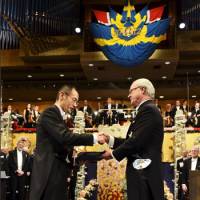Shinya Yamanaka of Kyoto University received on Monday this year's Nobel Prize in physiology or medicine, along with Britain's John Gurdon, for discovering that mature cells can be reprogrammed into immature cells capable of turning into any kind of tissue of the human body.
Yamanaka and Gurdon were given medals and diplomas from Sweden's King Carl XVI Gustaf, along with other Nobel laureates, at the annual awards ceremony in Stockholm Concert Hall.
Of this year's Nobel winners, Yamanaka, a 50-year-old professor, is the youngest. He received the prize only six years after developing induced pluripotent stem cells, which he named iPS cells.
"If I use a marathon metaphor, the ceremony is just the halfway point," Yamanaka, who is fond of running, said before attending the festivities for the winners of the literature, physics, chemistry, medicine and economics prizes.
"Like a marathon, the latter part is going to be tougher. So I continue to do my best," he said.
Prime Minister Yoshihiko Noda released a statement congratulating Yamanaka, Japan's 19th Nobel winner, saying his passion for research on iPS cells has moved many people and carved out a frontier of scientific knowledge.
Noda said the government is committed to improving the research environment and regulations for iPS cells.



